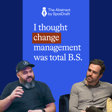
Ep 52: How Vanessa Wu, GC @Rippling tackled Silicon Valley Bank’s collapse
How do you raise nine figures in financing in twelve hours as the first Twitter-fueled bank run is happening around you and you feel the pressure of hundreds and thousands of employees depending on your ability to finish the deal so their paychecks clear?
Join Vanessa Wu, GC at Rippling, as she relives the moment her company overcame the disastrous collapse of Silicon Valley Bank and pulled through some lightning-fast deals to protect the income of the clients whose paychecks depend on them. Her department’s hard work turned a catastrophe into a boon to their company’s reputation, both with product users and investors.
Listen as Vanessa offers a masterclass in getting financing and deals over the finish line in record time, with tips on moving through the diligence process, keeping fees low, and why it's essential for lawyers to close as quickly as possible.
Read detailed summary: https://www.spotdraft.com/podcast/episode-52
Topics:
Introduction: 0:00
Becoming a top dealmaker at LiveRamp: 1:33
Moving quickly to close deals: 7:06
Offering operational solutions to small and medium businesses at Rippling: 10:08
Surviving the collapse of Silicon Valley Bank: 23:14
Collaborating with finance as a legal team: 36:21
Tips for a fast and low-fee financing deal-making process: 40:54
Favorite parts of day-to-day work: 41:54
Book recommendations: 44:22
What you wish you’d known as a young lawyer: 45:28
Connect with us:
Vanessa Wu: https://www.linkedin.com/in/vanessa-wu-7363359/
Tyler Finn: https://www.linkedin.com/in/tylerhfinn
SpotDraft: https://www.linkedin.com/company/spotdraft
SpotDraft is a leading contract lifecycle management platform that solves your end-to-end contract management issues.
Visit https://www.spotdraft.com to learn more.



















